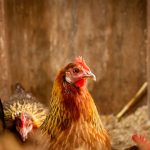Egg-eating behavior in chickens is a significant concern for poultry farmers, as it can lead to economic losses and reduced productivity. This behavior can stem from various factors, including environmental stressors, nutritional deficiencies, and learned behaviors within the flock. Identifying the root causes of egg-eating is essential for implementing effective prevention and management strategies.
Chickens may begin consuming their own eggs due to several reasons:
1. Nutritional deficiencies: Inadequate calcium or protein in their diet can lead chickens to seek these nutrients from their eggs. 2.
Overcrowding: Limited space and nesting areas can increase stress and competition, potentially triggering egg-eating behavior. 3. Boredom or lack of stimulation: Insufficient mental and physical engagement may cause chickens to explore and peck at eggs out of curiosity.
4. Accidental discovery: Chickens may inadvertently break eggs and discover their edibility, leading to continued egg consumption. 5.
Learned behavior: Chickens can observe and mimic egg-eating behavior from other flock members. 6. Environmental factors: Insufficient nesting areas, bright lighting in nesting boxes, or disturbances during laying can contribute to egg-eating.
7. Health issues: Underlying health problems may cause chickens to exhibit abnormal behaviors, including egg consumption. To address egg-eating behavior, farmers should carefully observe their flock and assess the living conditions, nutrition, and overall health of the chickens.
By identifying and addressing the underlying causes, poultry farmers can implement targeted interventions to reduce or eliminate egg-eating behavior, thereby improving flock productivity and profitability.
Table of Contents
- 1 Identifying the causes of egg-eating in chickens
- 2 Preventing egg-eating behavior in chickens
- 3 Implementing management strategies to discourage egg-eating
- 4 Addressing nutritional deficiencies in chickens to reduce egg-eating
- 5 Seeking professional assistance for persistent egg-eating behavior
- 6 Creating a supportive environment for egg-laying chickens
- 7 FAQs
- 7.1 What are some reasons why chickens eat their own eggs?
- 7.2 How can I prevent chickens from eating their eggs?
- 7.3 Are there any health risks associated with chickens eating their eggs?
- 7.4 Can I train my chickens to stop eating their eggs?
- 7.5 What are some signs that my chickens are eating their eggs?
Key Takeaways
- Egg-eating behavior in chickens can be influenced by environmental stressors and nutritional deficiencies
- Causes of egg-eating in chickens include overcrowding, lack of nesting boxes, and boredom
- Prevent egg-eating behavior in chickens by providing adequate nesting boxes and a stimulating environment
- Implement management strategies such as collecting eggs frequently and using fake eggs to discourage egg-eating
- Address nutritional deficiencies in chickens by providing a balanced diet with sufficient calcium and protein
- Seek professional assistance if egg-eating behavior persists despite preventive measures
- Create a supportive environment for egg-laying chickens by ensuring access to clean nesting areas and a balanced diet
Identifying the causes of egg-eating in chickens
Overcrowding and Stress
One common cause of egg-eating is overcrowding in the coop, which can lead to stress and competition among the chickens. When chickens feel crowded and stressed, they may turn to egg-eating as a coping mechanism.
Nesting Box Design and Maintenance
Additionally, if the nesting boxes are not properly designed or maintained, it can lead to broken or dirty eggs, which may trigger egg-eating behavior in chickens. It’s essential for farmers to regularly inspect the nesting boxes and ensure that they are clean, comfortable, and provide enough privacy for the hens to lay their eggs undisturbed.
Another potential cause of egg-eating in chickens is a lack of proper nutrition. If the chickens are not receiving a balanced diet with enough calcium and protein, they may start eating their own eggs to compensate for these deficiencies. Farmers should work with a poultry nutritionist to ensure that their chickens are receiving the necessary nutrients for optimal health and egg production. Additionally, it’s important to consider the social dynamics within the flock, as aggressive or dominant chickens may peck at eggs and encourage others to do the same.
By identifying the specific causes of egg-eating in chickens, farmers can take targeted measures to address these issues and prevent further egg-eating behavior.
Preventing egg-eating behavior in chickens

Preventing egg-eating behavior in chickens requires a proactive approach that addresses the underlying causes and promotes positive behaviors. One effective prevention strategy is to provide adequate nesting boxes that are clean, comfortable, and located in a quiet and secluded area of the coop. This will help reduce the likelihood of broken or dirty eggs, which can trigger egg-eating behavior in chickens.
Additionally, farmers can use fake or ceramic eggs in the nesting boxes to discourage pecking and eating of real eggs. This can help train the chickens to leave the eggs alone and focus on laying them instead. Another important prevention strategy is to ensure that the chickens are receiving a balanced diet with enough calcium and protein to support healthy egg production.
Farmers should work with a poultry nutritionist to formulate a diet that meets the specific needs of their flock. Providing environmental enrichment such as perches, dust baths, and toys can also help reduce boredom and prevent egg-eating behavior in chickens. It’s important for farmers to regularly monitor their flock for any signs of stress, aggression, or nutritional deficiencies, and take proactive measures to address these issues before they escalate into egg-eating behavior.
Implementing management strategies to discourage egg-eating
Implementing effective management strategies is crucial for discouraging egg-eating behavior in chickens and promoting positive behaviors within the flock. One important management strategy is to provide enough space in the coop to reduce stress and competition among the chickens. Overcrowding can lead to aggressive behaviors and egg-eating, so it’s important for farmers to ensure that their flock has enough room to move around comfortably.
Additionally, farmers can use dividers or curtains in the nesting boxes to provide privacy for the hens while they lay their eggs, which can help reduce the likelihood of broken or dirty eggs that may trigger egg-eating behavior. Another important management strategy is to establish a regular egg collection routine to minimize the amount of time that eggs are left unattended in the nesting boxes. The longer eggs are left uncollected, the higher the risk of them being pecked at or eaten by the chickens.
By collecting eggs frequently throughout the day, farmers can reduce the opportunity for egg-eating behavior to occur. It’s also important for farmers to observe their flock for any signs of aggression or bullying, as dominant chickens may peck at eggs and encourage others to do the same. By implementing effective management strategies, farmers can create a more supportive environment for their flock and discourage egg-eating behavior.
Addressing nutritional deficiencies in chickens to reduce egg-eating
Addressing nutritional deficiencies in chickens is essential for reducing egg-eating behavior and promoting healthy egg production within the flock. One common nutritional deficiency that can lead to egg-eating is a lack of calcium, which is essential for strong eggshells. If the hens are not receiving enough calcium in their diet, they may start eating their own eggs to replenish this nutrient.
Farmers should work with a poultry nutritionist to formulate a balanced diet that meets the specific needs of their flock, including enough calcium and protein to support healthy egg production. In addition to addressing nutritional deficiencies through diet, farmers can also provide supplements such as oyster shell or crushed eggshells to ensure that their chickens are receiving enough calcium. These supplements can be offered free-choice in a separate feeder so that hens can consume them as needed.
It’s important for farmers to regularly monitor their flock for any signs of nutritional deficiencies and adjust their diet or supplements accordingly. By addressing nutritional deficiencies in chickens, farmers can promote healthy egg production and reduce the likelihood of egg-eating behavior within their flock.
Seeking professional assistance for persistent egg-eating behavior

Seeking Professional Help
In some cases, persistent egg-eating behavior in chickens may require professional assistance from a veterinarian or poultry behavior specialist. If farmers have tried various prevention strategies and management techniques without success, it’s important to seek professional help to address this issue effectively.
Health Assessment and Dietary Adjustments
A veterinarian can conduct a thorough health assessment of the flock to rule out any underlying medical conditions that may be contributing to egg-eating behavior. They can also provide guidance on dietary adjustments or supplements that may help address any nutritional deficiencies within the flock.
Behavioral Insights and Environmental Enrichment
Additionally, a poultry behavior specialist can provide valuable insights into the social dynamics within the flock and offer targeted strategies for addressing aggressive or dominant behaviors that may be triggering egg-eating. They can also provide guidance on environmental enrichment and behavioral training techniques that can help discourage egg-eating behavior in chickens.
Access to Specialized Knowledge and Resources
By seeking professional assistance for persistent egg-eating behavior, farmers can gain access to specialized knowledge and resources that can help them effectively address this issue within their flock.
Creating a supportive environment for egg-laying chickens
Creating a supportive environment for egg-laying chickens is essential for promoting positive behaviors and reducing the likelihood of egg-eating within the flock. One important aspect of creating a supportive environment is providing comfortable and clean nesting boxes that are located in a quiet and secluded area of the coop. This will help reduce stress and competition among the hens while they lay their eggs, which can help prevent broken or dirty eggs that may trigger egg-eating behavior.
Additionally, providing enough space in the coop and environmental enrichment such as perches, dust baths, and toys can help reduce boredom and promote healthy behaviors within the flock. It’s also important for farmers to establish a regular egg collection routine to minimize the amount of time that eggs are left unattended in the nesting boxes. By collecting eggs frequently throughout the day, farmers can reduce the opportunity for egg-eating behavior to occur.
Farmers should also monitor their flock for any signs of stress, aggression, or nutritional deficiencies, and take proactive measures to address these issues before they escalate into egg-eating behavior. By creating a supportive environment for their flock, farmers can promote positive behaviors and reduce the likelihood of egg-eating within their chicken coop. In conclusion, understanding and addressing egg-eating behavior in chickens requires a multifaceted approach that considers various factors such as environmental conditions, nutrition, social dynamics within the flock, and potential health issues.
By implementing proactive prevention strategies, effective management techniques, addressing nutritional deficiencies, seeking professional assistance when needed, and creating a supportive environment for their flock, farmers can promote healthy egg production and reduce the likelihood of egg-eating behavior within their chicken coop. With careful observation and targeted interventions, farmers can create a positive and nurturing environment for their chickens that supports optimal health and well-being.
If you’re having trouble with chickens eating their own eggs, you might want to consider the design of your chicken coop. Hannah Montana Chicken Coop offers some great tips on how to set up your coop to prevent egg-eating behavior. Check out their article here for more information on creating a chicken-friendly environment.
FAQs
What are some reasons why chickens eat their own eggs?
Chickens may eat their own eggs due to nutritional deficiencies, boredom, overcrowding, or as a result of learning the behavior from other chickens.
How can I prevent chickens from eating their eggs?
To prevent chickens from eating their eggs, you can provide a balanced diet, ensure they have enough space and stimulation, collect eggs frequently, and use fake eggs or golf balls in the nesting boxes to discourage pecking.
Are there any health risks associated with chickens eating their eggs?
Yes, chickens eating their own eggs can lead to nutritional deficiencies, as well as potential spread of diseases if the eggs are contaminated.
Can I train my chickens to stop eating their eggs?
Yes, you can train chickens to stop eating their eggs by providing a comfortable and clean nesting area, collecting eggs frequently, and using positive reinforcement techniques to discourage the behavior.
What are some signs that my chickens are eating their eggs?
Signs that your chickens are eating their eggs include finding broken or missing eggs in the nesting boxes, egg yolk on their beaks or feathers, and a decrease in the number of eggs being laid.
Meet Walter, the feathered-friend fanatic of Florida! Nestled in the sunshine state, Walter struts through life with his feathered companions, clucking his way to happiness. With a coop that’s fancier than a five-star hotel, he’s the Don Juan of the chicken world. When he’s not teaching his hens to do the cha-cha, you’ll find him in a heated debate with his prized rooster, Sir Clucks-a-Lot. Walter’s poultry passion is no yolk; he’s the sunny-side-up guy you never knew you needed in your flock of friends!







